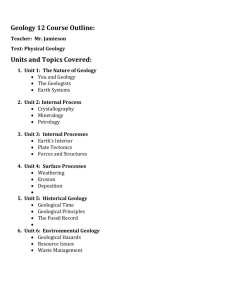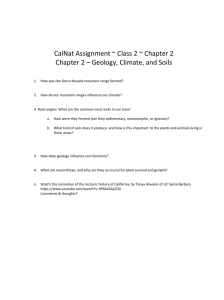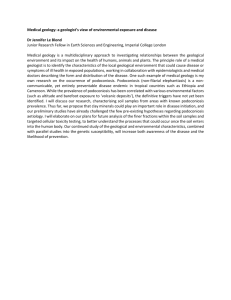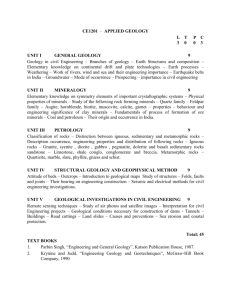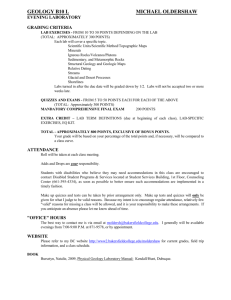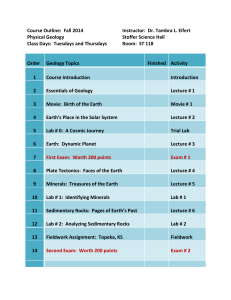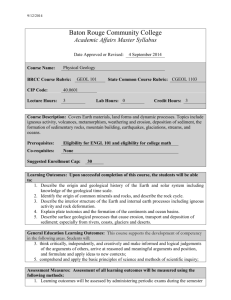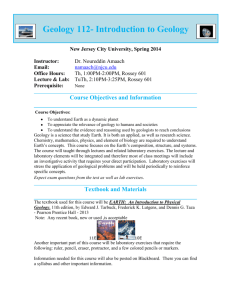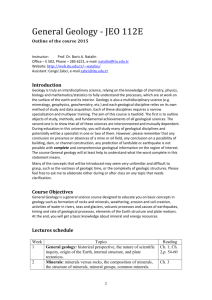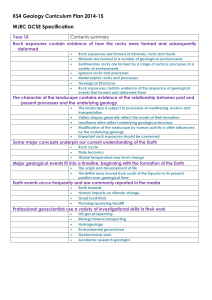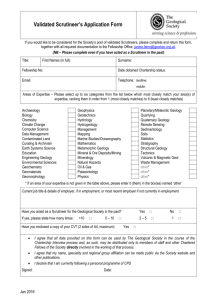File - Mr. Fox`s Science Centre
advertisement
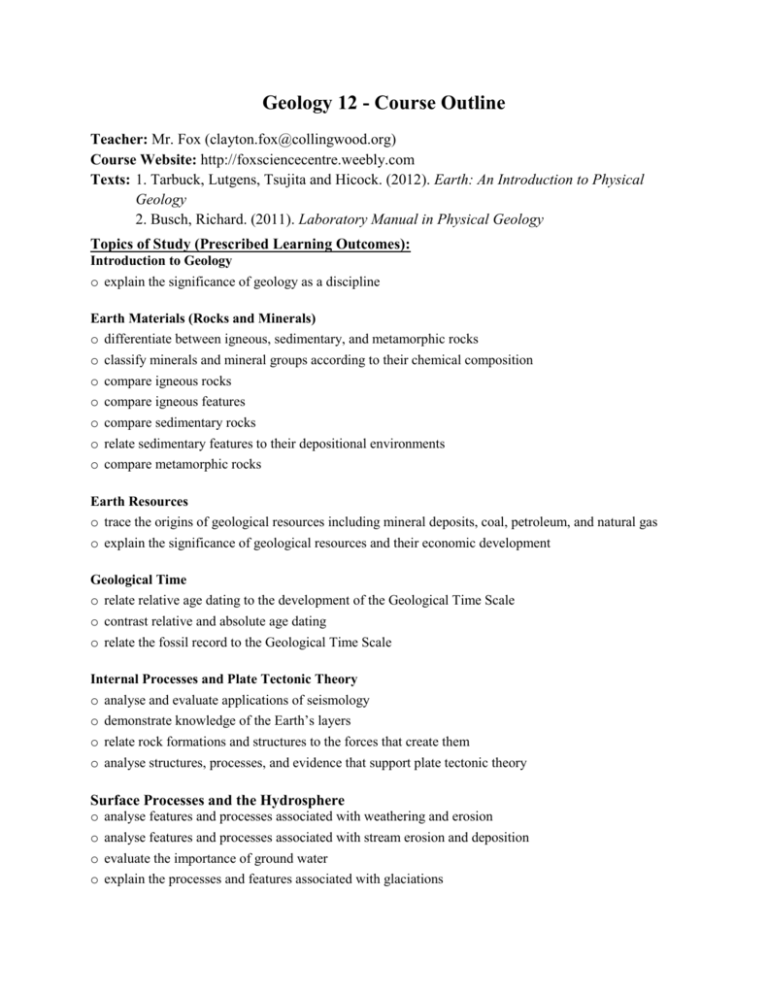
Geology 12 - Course Outline Teacher: Mr. Fox (clayton.fox@collingwood.org) Course Website: http://foxsciencecentre.weebly.com Texts: 1. Tarbuck, Lutgens, Tsujita and Hicock. (2012). Earth: An Introduction to Physical Geology 2. Busch, Richard. (2011). Laboratory Manual in Physical Geology Topics of Study (Prescribed Learning Outcomes): Introduction to Geology o explain the significance of geology as a discipline Earth Materials (Rocks and Minerals) o differentiate between igneous, sedimentary, and metamorphic rocks o classify minerals and mineral groups according to their chemical composition o compare igneous rocks o compare igneous features o compare sedimentary rocks o relate sedimentary features to their depositional environments o compare metamorphic rocks Earth Resources o trace the origins of geological resources including mineral deposits, coal, petroleum, and natural gas o explain the significance of geological resources and their economic development Geological Time o relate relative age dating to the development of the Geological Time Scale o contrast relative and absolute age dating o relate the fossil record to the Geological Time Scale Internal Processes and Plate Tectonic Theory o analyse and evaluate applications of seismology o demonstrate knowledge of the Earth’s layers o relate rock formations and structures to the forces that create them o analyse structures, processes, and evidence that support plate tectonic theory Surface Processes and the Hydrosphere o analyse features and processes associated with weathering and erosion o analyse features and processes associated with stream erosion and deposition o evaluate the importance of ground water o explain the processes and features associated with glaciations Evaluation The final mark will be based on course work (70%) and the mandatory final school exam (30%). Unit Tests Labs Quizzes 25% 20% 15% Projects Final Exam 10% 30% Expectations 1. Respect I expect a respectful attitude in the classroom. This involves respecting your classmates by listening to their ideas, and addressing ideas with constructive criticism. It is important to challenge ideas, but equally important that the ideas presented by others are valued. 2. Attendance The level of success in a course is directly related to attendance and active participation. You will need to inform me of any planned absences, but this will not relieve you of the responsibility of completing and handing in assignments because of an absence. If a student misses a test for an excused absence, it is expected that the student will write the exam upon returning to school. Unexcused absences will result in zeros for any assignments, quizzes, tests, etc. 3. Late Submissions Late submissions will inevitably affect the effort mark given for the course as well as the grade for that assignment. Instances do occur, however, when a late submission may be necessary. If you are going to be absent, ask for an extension in advance. The Collingwood late policy (as outlined below) will be in effect. Submission Date On-time 1 school day late 2 school days late 3 school days late 4-6 school days late 7+ school days late Punctuality Deductions No deduction 10% off total assignment mark 20% off total assignment mark 30% off total assignment mark Assignment will be on pass-fail basis only Assignment will be given a zero 4. Participation All students are expected to actively participate in classroom discussions, activities, etc. Participation includes being prepared for class and arriving promptly. 5. Homework Many of the labs will have to be worked on outside of class time. Students are expected to complete all assignments, projects in a timely manner and to adhere to all due dates 6. Evaluation A combination of evaluation methods will be used in order to obtain information about your Geology 12: Syllabus Page 2 skills and abilities. This combination will include testing, quizzes, laboratory work, homework assignments, projects, in class observations and others. Quizzes may be given without warning, so it is important that you remain caught up with homework and reading assignments as well as reviewing material. 7. Tests The Collingwood test policy will be adhered to: After an absence, students will write the test no later than the day of the second class following their return. If they fail to do so, they will receive a zero. Students will, however, be expected to demonstrate his/her knowledge of the material. The only exceptions will be in the submission of a doctor’s note. Teachers will notify parents via an email or phone call before the final day that the writing can occur. For further information on test writing expectations, please refer to the Collingwood School Academic Integrity Document: Plagiarism & Test Taking Agreement. *Retests will occur every Thursday morning at 7:10am. 8. Miscellaneous Extra help is always available and you are strongly encouraged to get help as soon as difficulties arise. Critical Thinking The Science Department considers the development of the critical thinking skills of our students to be essential to their success in science and in life. In order to address this skill we have chosen areas of focus for each grade. As students progress through these grades they will continue to master the skills from earlier grades. The skills chosen as a focus for later grades will also not be ignored in the earlier grades. Critical Thinking Skills Ask pertinent questions Adjust opinions when new facts are found. Admit a lack of understanding or information where necessary Look for evidence Examine problems carefully Analyze data Define criteria Weigh evidence and draw reasoned conclusions Reject incorrect or irrelevant information Assess statements and arguments Identify assumptions and biases Consider a variety of explanations Identify missing information Suspend judgment until all facts have been gathered and considered Synthesize concepts across disciplines Geology 12: Syllabus Grade 7 7 7 8 8 8, 9 9 9 10 10, 11 10, 11 11, 12 11 12 12 Page 3

